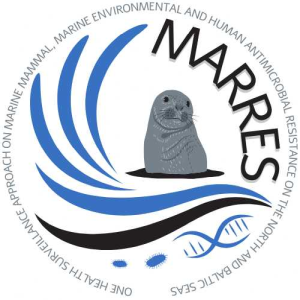
| Project data | |
|---|---|
| Project leader: | Prof. Prof. h. c. Dr. Ursula Siebert |
| Scientific staff: | Dr. Stephanie Groß |
| Project term: | April 2024 until March 2027 |
| Sponsorship: | Bundesministerium für Bildung und Forschung / DLR |
| Cooperation partner: |
Project coordination: Prof. Dr. Christa Ewers, Institute of Hygiene and Infectious Diseases of Animals Justus-Liebig-University Giessen, Germany Dr. Iwona Pawliczka vel Pawlik, University of Gdańsk Institute of Oceanography, Hel Marine Station, Poland Prof. Modestas Ruzauskas, Lithuanian University of Health Sciences, Microbiology and Virology Institute, Lithuania Žilvinas Kleiva, PhD, Lithuanian Sea Museum, Lithuania Martin Hölzer, Robert Koch Institute, Germany |

Project description
Antimicrobial resistance (AMR) is a global health threat that involves complex, opaque transmission processes between humans, animals and the environment. The particular role of wildlife and the environment in the emergence, maintenance, dissemination and transmission of AMR bacteria and AMR genes is widely unknown. In the MARRES project, AMR bacteria from grey and harbour seals of the North and Baltic Sea and of sea water (environmental - eDNA) will be determined to perform a targeted surveillance of these two marine ecosystems. State of the art microbiological techniques, genome and metagenome sequencing will be applied. The evaluation of published human and animal AMR data of the investigated areas as well as on a global scale shall put the obtained results from this almost unexplored field into a One Health context. The approach covers three One Health settings of marine ecosystems as one of the greatest players in Global Health. It promises to provide relevant insight into transmission pathways of AMR bacteria, including pathogens, and of AMR determinants between humans, wildlife and the environment. A database for AMR associated to marine mammals in the Baltic Sea will be established following the FAIR principles. On a longer term, this project should be the starting point to establish a transnational network between experts in the field of AMR and marine biologists in Europe. The implementation of a harmonized AMR surveillance in the marine ecosystem sector will significantly contribute to AMR mitigation strategies and thus to public health.
Contact person
Stiftung Tierärztliche Hochschule Hannover
Institute for Terrestrial and Aquatic Wildlife Research
Werftstr. 6
25761 Büsum
Dr. Stephanie Groß
Phone: +49 (0)511-8568163
e-mail schreiben


